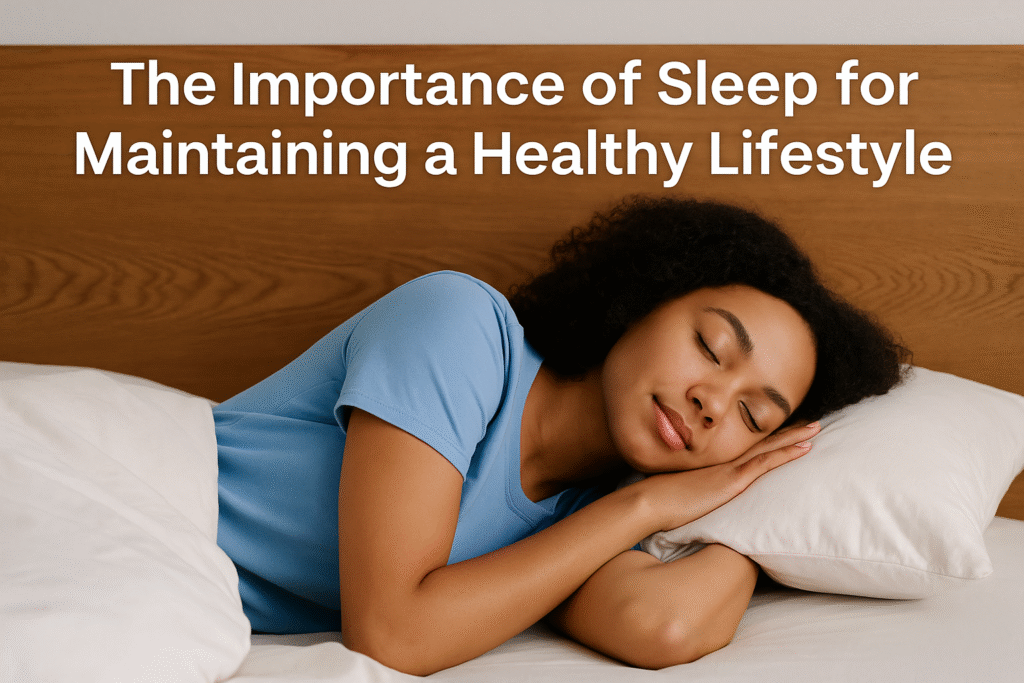
The Importance of Sleep for Maintaining a Healthy Lifestyle
Sleep is frequently ignored in our fast-paced society. However, the conventional wisdom that sleep is a necessity rather than a luxury is consistently supported by research. Sleep is just as important for maintaining and achieving overall health as diet and exercise.
What Happens When You Sleep?
Sleep is more than just a time when the body rests. Instead, it is an active phase characterized by important physiological and psychological activities:
• Regeneration and repair of cells
• Hormone regulation (such as growth hormone, melatonin, and cortisol)
• Memory consolidation and brain detoxification
• Improving one’s immune system
The stages of sleep known as REM (rapid eye movement) and non-REM sleep alternate throughout the night and serve distinct functions necessary for optimal mental and physical health.
How Your Body Gets Stronger from Sleep: Sleep Benefits for Physical Health
Immunity and Function
A well-rested body is better able to fight infections. T-cells and cytokines, two types of immune cells, are produced more efficiently during sleep.
Health of the Heart
There is a link between not getting enough sleep and an increased risk of high blood pressure, heart attacks, and strokes. Blood pressure drops during deep sleep, allowing the heart to relax and recover.
Controlling Your Weight
Overeating and possible weight gain are brought on by disrupting the balance of hunger-regulating hormones like ghrelin and leptin during sleep deprivation.
Harmony of Hormones
In order to maintain healthy levels of hormones related to stress (cortisol), metabolism (insulin), and reproduction (testosterone and estrogen), adequate sleep is essential.
The Mental Edge: How Sleep Improves Concentration, Mood, and Brainpower
Sleep’s Cognitive and Mental Advantages
• Improves learning and memory: The brain organizes new information and creates memories while you sleep.
• Improves mood and emotional control: Getting enough sleep helps reduce stress and emotional responses.
• Improves focus and decision-making: Lack of sleep causes brain fog, sluggish reflexes, and poor judgment.
The Hidden Dangers: How Lack of Sleep Increases the Risk of Disease
The Relationship Between Disease Prevention and Sleep
Numerous health problems have been linked to chronic sleep deprivation:
- Type 2 Diabetes: Sensitivity to insulin decreases.
- Cardiovascular Disease: Inflammation and elevated blood pressure.
- Obesity: Hormones that control appetite are disrupted.
- Anxiety and Depression: Exacerbate symptoms and emotional instability.
- Alzheimer’s Disease: Brain detoxification is disrupted during deep sleep.

The following are suggestions from the National Sleep Foundation:
Sleep Guidelines by Age Group
- Adults (age 18–64): 7–9 hours per night
- Teens (14–17 years): 8–10 hours per night
- Children (ages 6–13): 9–11 hours per night
Simple Ways to Get a Better Night’s Sleep Every Night
Strategies for Getting a Better Night’s Sleep
• Even on weekends, maintain a regular sleeping schedule.
• Avoid using screens at least an hour before going to bed because blue light reduces melatonin.
• Create a quiet, cool, and dark sleeping space.
• Avoid drinking alcohol or eating large meals in the evening.
• Engage in methods like meditation, deep breathing, or gentle stretching for relaxation.
What the Studies Say About Your Health and Sleep
Health and Sleep Research
Sleep deprivation has a negative impact on brain function, immune responses, and the risk of chronic diseases, according to Harvard Medical School.According to a study published in The Lancet, even a single night of insufficient sleep can significantly affect mood, memory, and attention.
The National Heart, Lung, and Blood Institute (NHLBI) points out that people who sleep less than seven to nine hours a night have a higher risk of developing chronic diseases.
